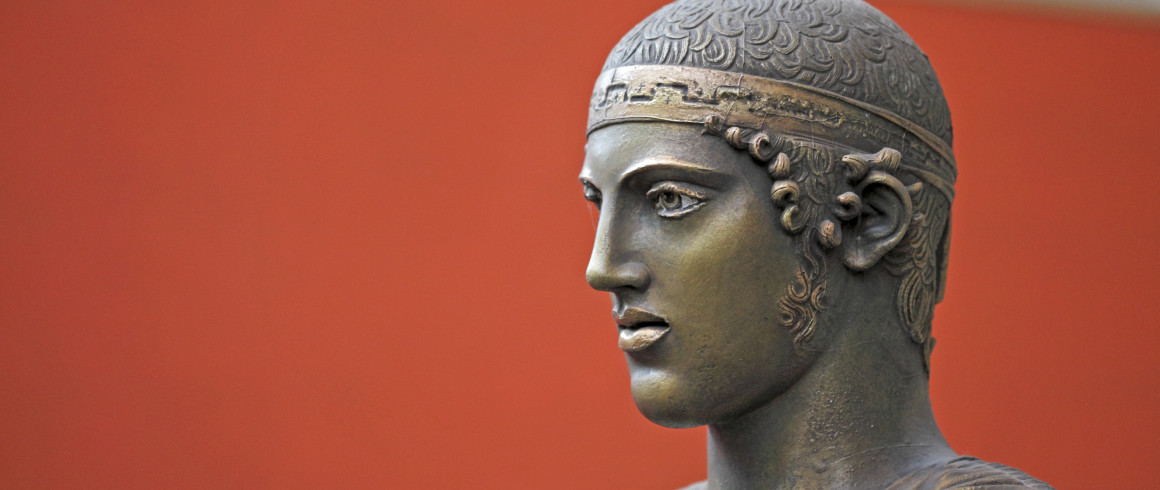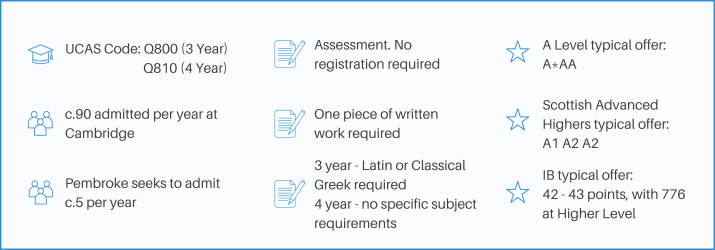Classics
The most rewarding way to study the ancient world is to learn to make connections between what might appear to be quite different aspects of its study. Our discipline considers a whole culture (or cultures), and so each text, each inscription, each philosophical idea, each pot and piece of sculpture has a rich social and intellectual context which can be explored in ever-widening circles. In the early stages of their course, Pembroke classicists are encouraged to investigate the whole range of studies available in the Faculty - literary, philosophical, historical, philological and archaeological - so that they can start to make these connections for themselves.
With time it is both inevitable and welcomed that different tastes emerge, and students are encouraged to pursue particular interests in depth rather than follow a very tightly controlled schedule. Thus, for example, literature work may cover any period of Greek and Roman antiquity from Homer to the fifth century A.D., rather than being concentrated on a few more familiar authors; some students may prefer philosophy and history, others archaeology and philology.
Classics at Pembroke
Pembroke typically takes about five students for Classics each year. We were among the first Colleges to admit students for the 4-year course. Our exceptionally strong and broad range of expertise across many Classical subdisciplines ensures that much of the Classics teaching can be delivered in-house. Directors of Studies also support students by ensuring top quality supervision, providing close monitoring, excellent library resources and tailor-made teaching solutions where necessary. At Pembroke we strongly believe that the necessary structures are firmly in place to give students all the necessary academic and pastoral support. Performance within the University is outstanding and Pembroke students have topped the examination class list in at least one part of the Classical Tripos in 18 out of the last 20 years.
In the first year, there is also a termly 'get- together' of the whole group in College, with the Director of Studies, to discuss particular topics and issues arising from lectures and supervisions, to air matters of a general, methodological kind, and to monitor how the course is going.
Applicants to Classics, for both the three and four year courses, who are invited to interview will sit a central Faculty assessment. For three year applicants, the Faculty assessment will be incorporated into the interview. Those applying to the four year course at Pembroke will sit a language aptitude test in addition to the central assessment. An example paper for the Language aptitude test can be found here, and the solutions here. Both the three and four year courses are likely to have a short exercise in advance of the interview; for the three year course this will include some translation and comprehension questions.
Pembroke Classics Teaching Staff
Professor Torsten Meissner - Director of Studies
As the overall Director of Studies in Classics and I am responsible for having oversight of students development and progression over the years and to aid the year-group Director of Studies in ensuring that all students fulfil their potential and make the choices that are right for them. In addition, I organise supervision and other teaching for Part 1B and Part II students and make sure that I know all students well.
I am Professor of Classical and Comparative Philology and am heavily involved in Faculty teaching, covering all aspects of Greek and Latin synchronic and diachronic philology and linguistics, Mycenaean studies and comparative Indo-European philology.
I take my teaching very seriously and in 2021 I was awarded "proxime accessit" in the student-led CUSU teaching award in the category "Lecturer of the Year".
Dr Moreed Arbabzadah - Director of Studies for Prelims and Part 1A
As Director of Studies in Classics for Prelims (first year of the 4-year course) and Part IA (first year of the 3-year course, second year of the 4-year course), I will oversee the initial stages of your time at Pembroke. Don't worry, you'll be in safe hands. I did the course myself as an Intensive Greek student (I did Latin but not Greek at school), so I'm very familiar with what it's like to be a Classicist at Cambridge. At Pembroke we are blessed with an exceptionally strong Classics community, which makes it a particularly great place to study Classics.
I have a wide range of academic interests. When I was a student I mostly took the linguistics options within Classics; my PhD took a linguistic approach to inscriptions called curse tablets, which are mostly pieces of lead with a magical curse against someone. I've published articles which take linguistics approaches to Latin and Greek texts, and a love of the languages is the thread that runs through all my work. More recently I've done a lot of work on Medieval Latin. I'm currently working alongside wonderful colleagues to create editions of some Latin works by a 12-century author called Gerald of Wales.
Professor Renaud Gagné - Professor of Ancient Greek Literature and Religion
Dr Rebecca Lämmle - University Associate Professor in Classics [Greek literature]
Dr Connie Bloomfield-Gadêlha - College Research Fellow in Reception of Classical Antiquity
Professor Michael Reeve - Emeritus Kennedy Professor of Latin
Michael Reeve has been in retirement since 2008 and no longer teaches but comes to College most weeks, is in regular touch with the other classical fellows, enjoys meeting both undergraduates and graduate students at termly parties, and feels flattered to be consulted on anything that involves Latin, especially Latin manuscripts, on which he continues to publish. He also loves the range of concerts and recitals put on by our own or visiting musical talent.

